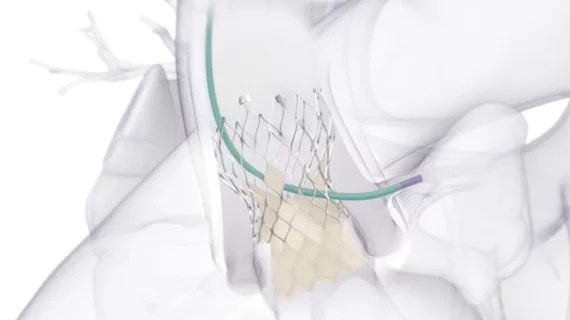TAVR vs. SAVR: Medtronic’s Evolut platform linked to cost savings, key benefits for low-risk patients
Treating low-risk patients with transcatheter aortic valve replacement (TAVR) instead of surgery is associated with significant cost savings, according to new data presented at Cardiovascular Research Technologies (CRT) 2024 in Washington, D.C.
CRT is an annual gathering of some of the world’s biggest names in interventional cardiology and structural heart disease. Medtronic shared data from two new TAVR studies at the four-day event.
Both Medtronic studies were based on data from the Evolut Low Risk Trial, an ongoing analysis of low-risk patients treated with either TAVR with an Evolut valve or surgical aortic valve replacement (SAVR). Four-year findings from the trial were presented at TCT 2023 in San Francisco and published in the Journal of the American College of Cardiology.[1] Overall, TAVR was associated with a higher survival rate than SAVR in addition to improved hemodynamics.
An economic analysis of the Evolut Low Risk Trial
Medtronic used data from the Evolut Low Risk Trial to perform a cost-effectiveness analysis of TAVR and SAVR. Researchers found that the average 30-day costs were $45,887 per patient for TAVR and $51,075 per patient for SAVR. In addition, TAVR was linked to a lifetime incremental cost-effectiveness ratio (ICER) of $2,119 per quality-adjusted life year.
Based on how industry groups value ICER data, Medtronic said these findings suggest TAVR with an Evolut valve should be seen as a “high-value” treatment option for low-risk patients.
“As more and more patients are diagnosed with aortic stenosis and undergo TAVR, it is important to use devices that offer exceptional results for patients, while also delivering economic value to the healthcare system,” David J. Cohen, MD, MSc, director of clinical and outcomes research at the Cardiovascular Research Foundation, director of academic affairs at St. Francis Hospital and a faculty member at Columbia University, said in a prepared statement. “These data complement the extensive body of clinical evidence for Evolut TAVR and demonstrate that it is a solution that provides substantial benefit to our patients in a highly cost-effective manner.”
An updated comparison between TAVR and SAVR
Medtronic’s other big TAVR presentation at CRT 2024 was yet another fresh look at four-year data from the Evolut Low Risk Trial. In this instance, researchers ran an updated analysis that excluded all data related to Abbott’s Trifecta surgical valves due to concerns about their durability. Medtronic saw this as a chance to ensure researchers were exclusively comparing contemporary TAVR valves with contemporary SAVR valves.
Overall, researchers found that TAVR with the Evolut valve was associated with a lower all-cause mortality/disabling stroke rate (10.7% vs. 14.2%) than SAVR and “significantly better hemodynamics.”
“This new data supports the growing body of evidence for TAVR at a time when AS is the most common surgically managed heart valve disease,” Basel Ramlawi, MD, system chief of cardiothoracic surgery at Main Line Health System and co-director of the Lankenau Heart Institute, said in the same statement. “We are encouraged by the results of this contemporary data, showing that we can help improve outcomes in patients with less risk of mortality and disabling stroke compared to the surgical option.”
‘Valve design matters’
Nina Goodheart, a senior vice president at Medtronic and president of the company’s structural heart and aortic division, said she and her colleagues are proud of these updated looks at the Evolut Low Risk Trial.
“At Medtronic, we continue to emphasize that valve design matters,” she said. “These data further exemplify Medtronic’s dedication to providing differentiated treatment options like the Evolut TAVR platform to reach the growing population of low-risk symptomatic severe AS patients.”

